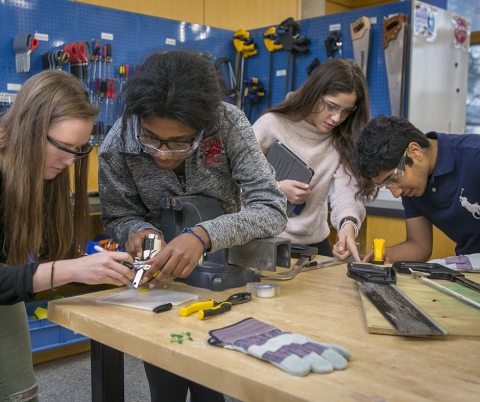Impacts of Collaborative Learning in STEM (2020-2021)
This project investigated the impacts of collaborative learning on course-related behaviors and enthusiasm for course content in undergraduate STEM classrooms at Duke University. Team members aimed to identify teaching practices in STEM classrooms that improve retention rates for all students, close achievement gaps, generate enthusiasm for course content and promote equity in the classroom.
The 2019-2020 team designed a survey, which included self-assessments of motivation, belonging, support and self-efficacy, for a qualitative analysis of the effects of collaborative learning on students in STEM classes through the Trinity College of Arts & Sciences. The 2020-2021 project team expanded the study of collaborative learning practices to include online learning formats under COVID-19 conditions.
In Fall 2020, team members distributed their survey, which asked students about perceived course dynamics, such as instructor support, competitiveness and sense of belonging. To gain a richer understanding of the class environment and structure, the team also distributed a survey for faculty members about the structure of their course.
In Spring 2021, the team compared survey responses from Fall of 2019 and Fall of 2020 to elucidate trends between years and dig deeper into course characteristics. The team found a significant decrease in overall sense of belonging from 2019 to 2020. They also found that this significant drop in Fall 2020 was associated with students’ perception of instructor support, feeling of competitiveness and student class standing.
The team concluded that a new age of teaching and learning after the pandemic, which will likely include online, in-person and hybrid classroom environments, must include prioritization of a sense of belonging. It is crucial for instructors to acknowledge and ameliorate the factors that contribute to decreased sense of belonging for online students and to place a special emphasis on being supportive and available, especially to younger students.
Timing
Summer 2020 – Spring 2021
This Team in the News
Duke Senior Awarded George J. Mitchell Scholarship to Study in Ireland
Duke Names Second Class of Nakayama Scholars
Team Outputs
Teaching and Learning During a Pandemic (2021 Fortin Foundation Bass Connections Virtual Showcase)
Student Sense of Belonging in STEM: Before and During COVID-19 (poster by Madelyne Huibregtse, Nicole Santeiro, Alexandra Bennion, Matthew Long, Alina Perez, Sarah Simmons, Isabella Swigart, Taylor Braswell, Benjamin Thier, Clarke Shead, Junette Yu, Thomas Newpher, Minna Ng and Dorian Canelas)
More Structured Classrooms and Supportive Instructors Lead to Better Student Experiences (blog post by Minna Ng and Thomas Newpher)
This project team was originally part of the Education & Human Development theme of Bass Connections, which ended in 2022. See earlier related team, Collaborative Learning in STEM: Impacts on Student Motivation, Retention and Self-efficacy (2019-2020).
Image: First-year engineering students tackle a service project during their EGR101L course, by Jared Lazarus/Duke University

Team Leaders
- Elizabeth Bucholz, Pratt School of Engineering-Biomedical Engineering
- Dorian Canelas, Arts & Sciences-Chemistry
- Thomas Newpher, Arts & Sciences-Psychology and Neuroscience
- Minna Ng, Arts & Sciences-Psychology and Neuroscience
/graduate Team Members
-
Madelyne Huibregtse, Masters of Public Policy
/undergraduate Team Members
-
Alexandra Bennion, Biology (BS)
-
Matthew Long, Biology (AB)
-
Alina Perez, Computer Science (BS)
-
Alberta Simmons, Sociology (AB)
-
Isabella Swigart, Statistical Science (BS)
/yfaculty/staff Team Members
-
Jeffrey Forbes, Arts & Sciences-Computer Science
